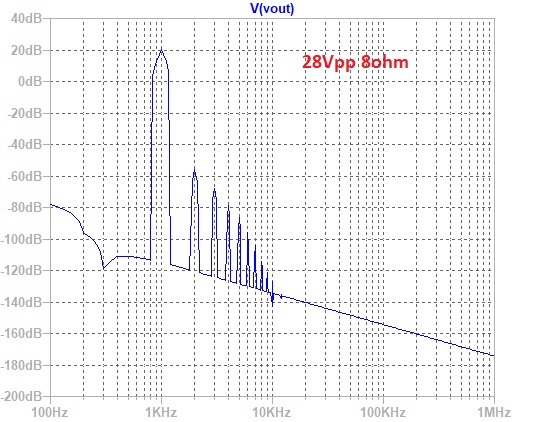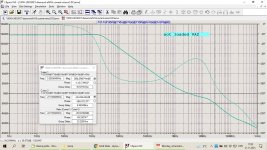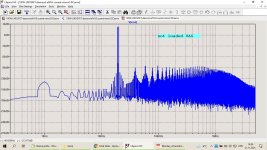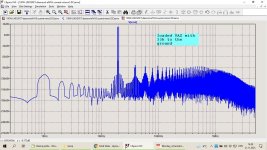I think uniform distortion does not sound as good as monotonically decreasing higher orders. This has been generally accepted as why SE Class A amps sound so good. You want dominant second or third harmonic and then 4th, 5th, decreasing about -6dB to -10dB per order and this quickly goes to the floor. Try to avoid odd orders 5th, 7th, 9th as they resemble harsh mechanical sounds and despite being so low in absolute level, together as a whole, they can sound fatiguing. I am very sensitive to this and can hear it in amp pretty easily.
For example, here is simulatuon for Aksa's Alpha Nirvana:

For example, here is simulatuon for Aksa's Alpha Nirvana:
Last edited:
You are:Who is talking about certain frequencies,
First one have almost equal distortion over whole audio bandwidth and second one is with very low distortion until 1 kHz (simulation shows almost zero distortion) and gradually increasing after that.
I think uniform distortion does not sound as good as monotonically decreasing higher orders.
It is subjective, but I agree.
I made same amplifier with output biased to class AB and class A. The class A is sound better.
Here is not question about compensation. This is the same amp with the same type of compensaion (OITPC - Output Inclusive Two Pole Compensation) but one with resistive (passive) loaded IPS and other with active (CM) loaded IPS and in that way getting different Loop Gain, consequently different level and shape of THD over audio band.
That is reason i always choose resistive loaded than a mirror. Sound more neutral and open. With a simple Blameless circuit i can see clearly this thing when try to change the loads of the IPS.
To conclude this tread I would like to show some more simulation on the same amp. It uses active loaded IPS but simulated in two situations, first one with VAS not loaded (keep the LG high at 120 dB up to 1 kHz) and VAS loaded with 33k to the ground (keep LG lower at 80 dB almost up to 20 kHz). Attached are LG plots and corresponding IMD simulation with two frequencies, 19 kHz and 20kHz of equal amplitude.
From this, I hope, it's clear that is better to have as high LG as you can get even if is not extended to the whole audio band.
From this, I hope, it's clear that is better to have as high LG as you can get even if is not extended to the whole audio band.



